If Mike Baggetta's music was a superhero, it would be Mr. Fantastic—always stretching, reaching, changing, absorbing. As it is, Baggetta is part of a rubbery new generation of jazz guitar superheroes. They are thoroughly schooled—he has a bachelor's degree in music and a master's in jazz studies from Rutgers—in the genre's core elements, but apply a sprawling, futuristic vision to their work.
Lately, Baggetta's explorations have taken him down the highways of improvisation to the intersection of rock, jazz, and textural music, with his band MSSV, an abbreviation for Main Steam Stop Valve. Think pressure, combustion, power, and hissing clouds of sonic poetry, and you're in the right pipeline.
The group's new album, which shares their name, is a playground for the temporal lobe. As his collaborators, bass and drum legends Mike Watt and Stephen Hodges, lay down plump grooves, Baggetta slathers on melodies that can evolve into whirling tornadoes, like the tail of “The Mystery Of," or sound like sprinkled fairy dust, in the lovely and sparkling notes that open “Every Growing Thing." He's also an empathetic accompanist, echoing between stately and squallingly fuzz-toned in “Nine Twenty December," respectfully coloring in the lyric sketches of Watt as the bassist pays tribute to his late mother. Main Steam Stop Valve features another Watt tune, the contemplative “June 16th," which was originally part of the Minutemen's 1984 epic Double Nickels on the Dime, and it's a bit slower here, with more meat on its bones. Watt also has the album's literal final word in “The Eureka Moment," where his flashcard lyrics transform a scene from the 1966 film classic The Sand Pebbles into a kind of roaring, joyful theme song for the group.
Baggetta's blend of technique and intuition make him an exceptional collaborator, which also shows in his earlier recordings with saxists Doug Mosher and Jason Rigby, trumpeter Kris Tiner, bassist Jerome Harris, drummer Billy Mintz, and his mentor and friend, the great 6-string adventurer David Torn. Onstage, his partners have included Nels Cline, Harris, Torn, and other notables. Torn, in particular, has opened several important windows for the 41-year-old Baggetta, who earned his bones in the New York City jazz and improvised music scene before moving to the more serene and affordable Knoxville, Tennessee, about five years ago.
Thanks to the presence of Watt and Hodges, and to his own kaleidoscopic playing, MSSV is taking Baggetta to a new level of recognition. And that's ultimately a testament to the power of wishful thinking. Baggetta had been doing some recording with engineer/producer and Big Ego label chief Chris Schlarb at Schlarb's studio in Long Beach, California. They were having a conversation about Torn's touchstone album, Cloud About Mercury, when Baggetta mentioned that Torn had simply cold-called the all-star cast of musicians on that recording, which captured the first time Torn, horn player Mark Isham, Chapman Stick virtuoso Tony Levin, and drummer Bill Bruford played together. Baggetta joked that maybe Schlarb could call Watt—whose 1997 album Contemplating the Engine Room inspired the guitarist as a youngster—and Jim Keltner, a foundational figure in rock drumming, to make an album with him. As luck had it, Schlarb knew Watt and was able to contact Keltner, and the result was 2019's Wall of Flowers, a largely improvised, highly colorful album that was mastered by Torn.
Keltner, who, at age 78, still plays like King Kong, no longer tours, so when it was time to hit the road, Baggetta made another wish. “I thought playing with Stephen Hodges would be great," he says. And yes, Schlarb also knew Hodges, who played on Contemplating the Engine Room and has a cornucopia of rock and blues credentials, from Tom Waits to Dave Alvin to Charlie Musselwhite. So it was on, and with some fuel from Watt, they named their triumvirate MSSV and cut Live Flowers on tour in 2019, as a precursor to Main Steam Stop Valve.
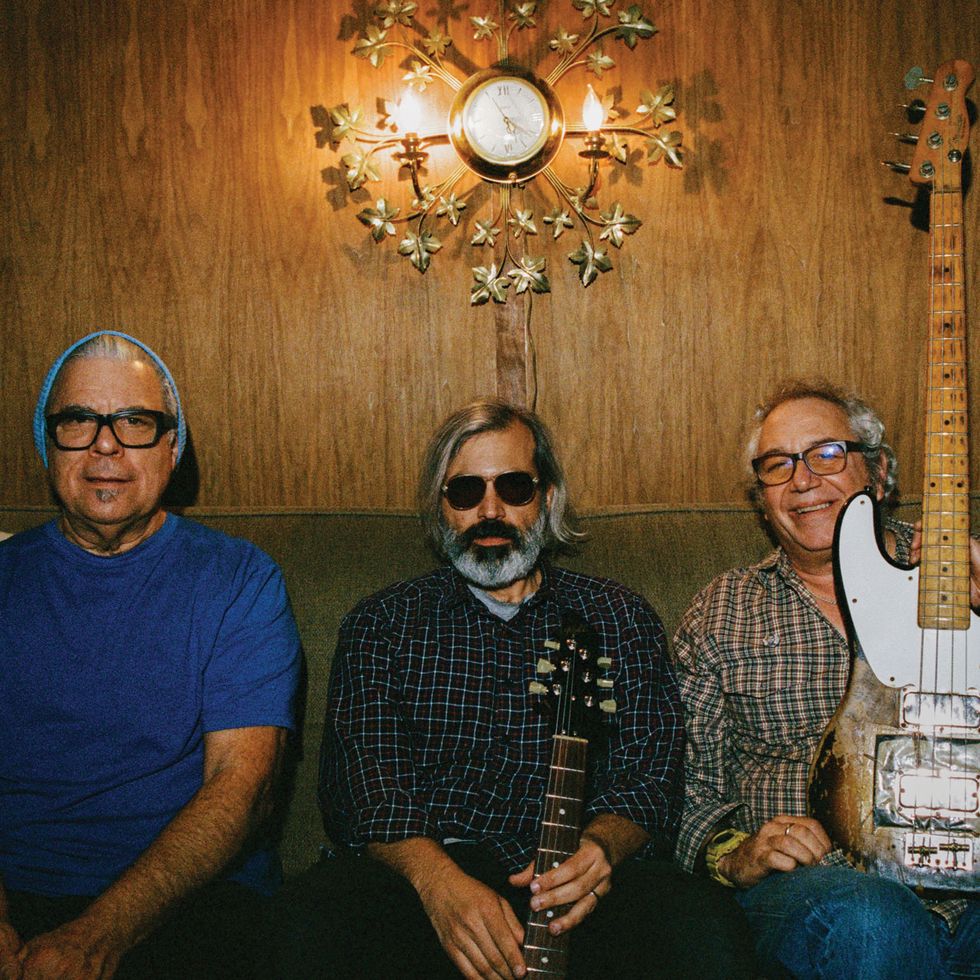
TIDBIT: Always defying convention, MSSV's new album is the trio's first studio recording, while their 2019 debut, Live Flowers, was cut onstage while touring.
“Playing with them is totally insane," Baggetta attests. “It's like a train going by at full speed, and you decide to grab it and hold on until it stops, so you don't die. They are totally fearless and committed to making this music."
Defying death onstage requires some specialized gear. In addition to a carefully curated pedalboard, Baggetta plays a pair of customized guitars made by Saul Koll, who he met through Torn, of course, as well as a Fender Strat, which Baggetta reconfigured along the lines of Torn's. It has Lindy Fralin Big Single pickups, a kill switch, a master volume, a master tone control, treble bleed, and a two-post Hipshot tremolo bridge. “A two-post is more sensitive than the 6-screw," he says. “That's also something I learned from Torn." And Baggetta does not spare the whammy. (See sidebar, “Living in Distress.")
Another key piece is the Steven Fryette-built Valvulator GP/DI Direct Recording Amplifier. The lightweight, tube-driven, 1-watt amp-in-a-box has become an MVP for Baggetta, and can be heard on Live Flowers. “From the very first MSSV gig, I had it with me and used it in a variety of ways to get a good sound," Baggetta explains. “We were using backline amps, so there were a few Twins and Marshalls along the way, and a couple spots where there were no amps. In that case, I took a line out into the front of the house. I've also used it with a DAW and went direct into Logic. For a modern Marshall, I took a line out into the effects loop, and with a Fender Twin, I plugged it into the input for the amp, almost like it's the last pedal in my chain, and it sounded fantastic."
While having world-class ability and gear is never a bad thing, what's left hanging in the air after hearing MSSV live or recorded is a cosmos of impressions, ideas, remembrances, and emotions evoked by the collective's painterly explorations of melody and sound. Baggetta knows that this is where the magic lives.
“Music needs to be tied to emotion," he says. “I understood this by the time I was 8. My dad is a guitarist, and would come home after gigs, and I wouldn't see him until morning, but his amp would be in the kitchen. I'd wake up and smell the smoke from the club he'd played, and I knew the amp was there. So I'd bug him to play me something. He would get his Les Paul out and plug it into the JC-120. What I remember most is he would say, 'this is a spooky song,' and I would feel afraid because of the sound of the minor chords. And then he'd play something happy, and I'd laugh. That's everything."
Baggetta plays two custom Kolls—a Tornado and a Superior—and his current favorite amp is this Fryette Aether combo, with the amp's power section on top.

GUITARS
STRINGS, PICKS & SLIDES
| AMPS
EFFECTS
|
As a trio, Baggetta, Hodges, and Watt ricochet between passages of raw momentum and shining beauty. This May 2019 performance was at New York City's Coney Island Baby, in lower Manhattan's Alphabet City. Photo by Scott Friedlander
Living in Distress
A cornerstone of Mike Baggetta's technique is the way he distresses notes, bending and pulling them out of tone and tune, to create a feeling of unease, or delight, or merriment. Often it's at the end of a phrase, making it stretch towards a new place before the next melodic line or spray of notes begins. It's an element of Baggetta's playing that reflects life, which often takes not-entirely expected turns.
“When you play a note, it has a certain space, and you want to think about the weight you want to give that space," he explains. “I like music not being perfect. We don't speak perfectly. The world doesn't operate perfectly. We don't make decisions perfectly. I want that authenticity in my music.
“It's become less conscious and more of something that just comes out in my phrasing when I play," he continues. “Like anything else, you work at it until it becomes second nature."
Baggetta's effort to portray life's imperfections in sound was sparked by music he adores. “A lot of my favorite vocalists are not the ones with perfect technique. I love singers that have a really raw, messed-up quality in their voices, and the way horn players bend a note at the end of a phrase.
“I bend the note down a little bit at the end of a phrase with the whammy bar, usually. That's something I stole from Jamie Baum, a flute player I used to do a lot of sessions with in New York. It sounded so human. When I started working with the whammy bar, I realized I could do that on my non-wind-controlled instrument."
There are other ingredients in his pitch-decay stew. Baggetta employs a Red Panda Tensor for sample-and-glitch sounds, and various fuzz pedals enhance the tones he's looking to twist. “I have a Trombetta Tornita that offers a sort-of endless feedback loop, so you can maintain pitch with the volume knob. And playing dyads, you can bring out the subtone with a fuzz pedal. A trick I stole from Henry Kaiser is momentary pitch shifting. I was using an Electro-Harmonix Pitch Fork for that for a while, and then I got a Chill Switch, which is a momentary line selector, but I have a kill switch on most of the guitars I play. What's definitely essential to creating these sounds is my guitars and the whammy bar. It's really all whammy bar."
Live at the Fingerprints Music shop in Long Beach, California, during 2019, Mike Baggetta, Mike Watt, and Stephen Hodges dig into the rich emotional terrain of outside-the-box playing. Baggetta is playing his Koll Superior custom, adding whammy bar vocalese.


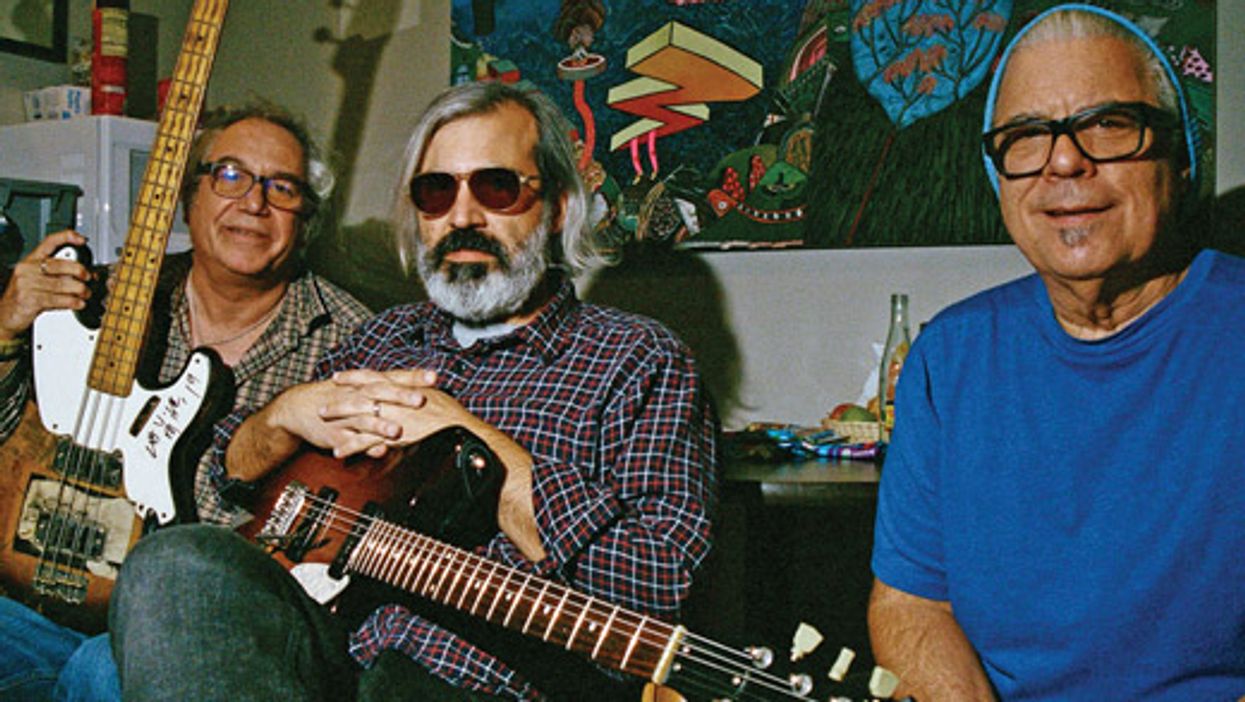

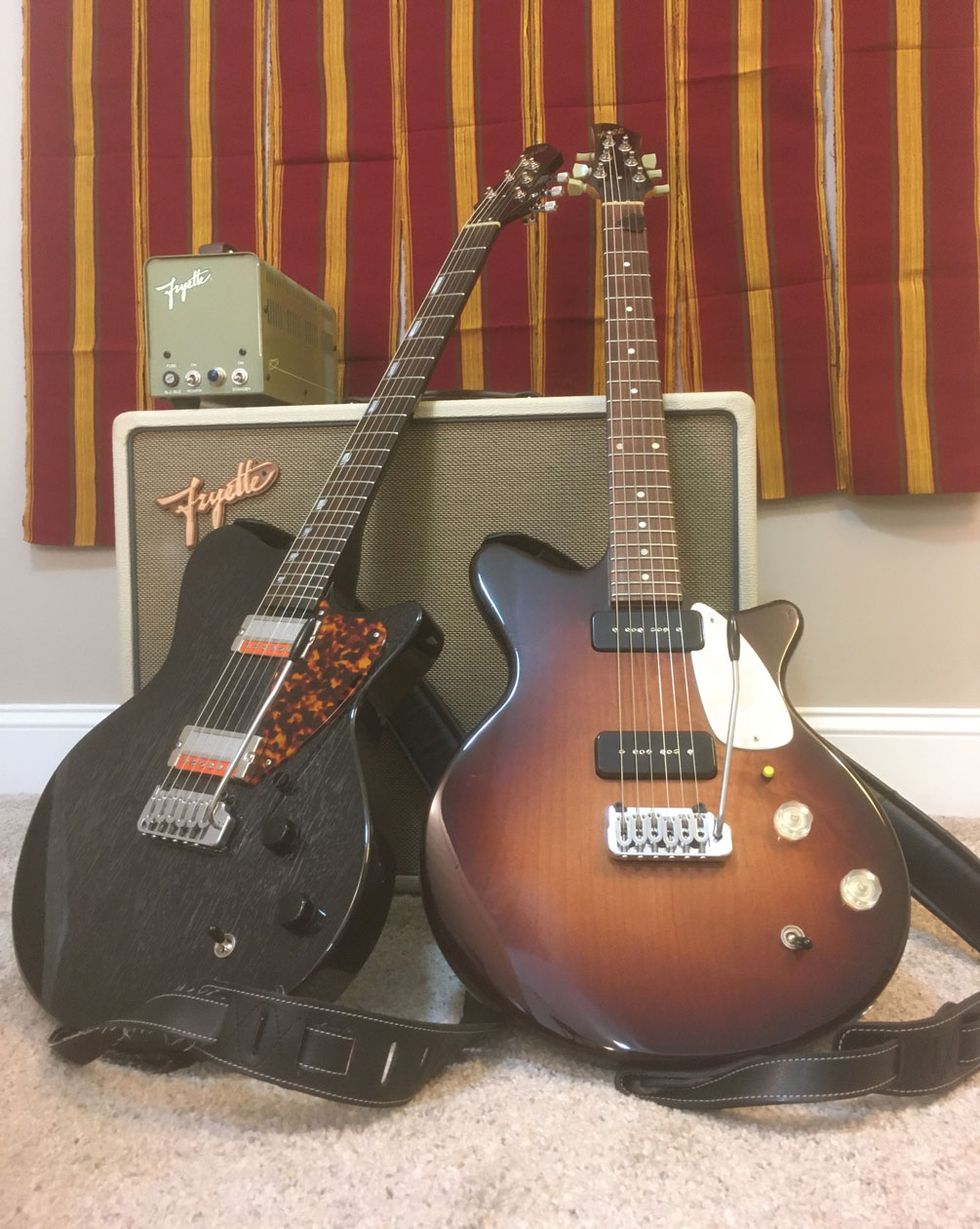
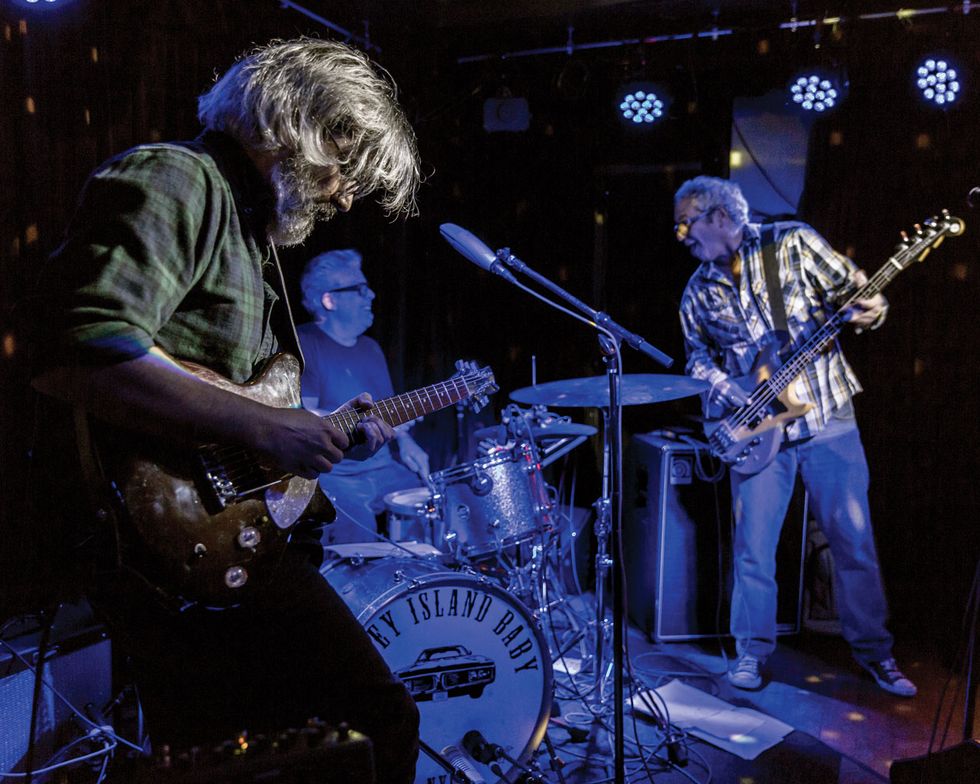











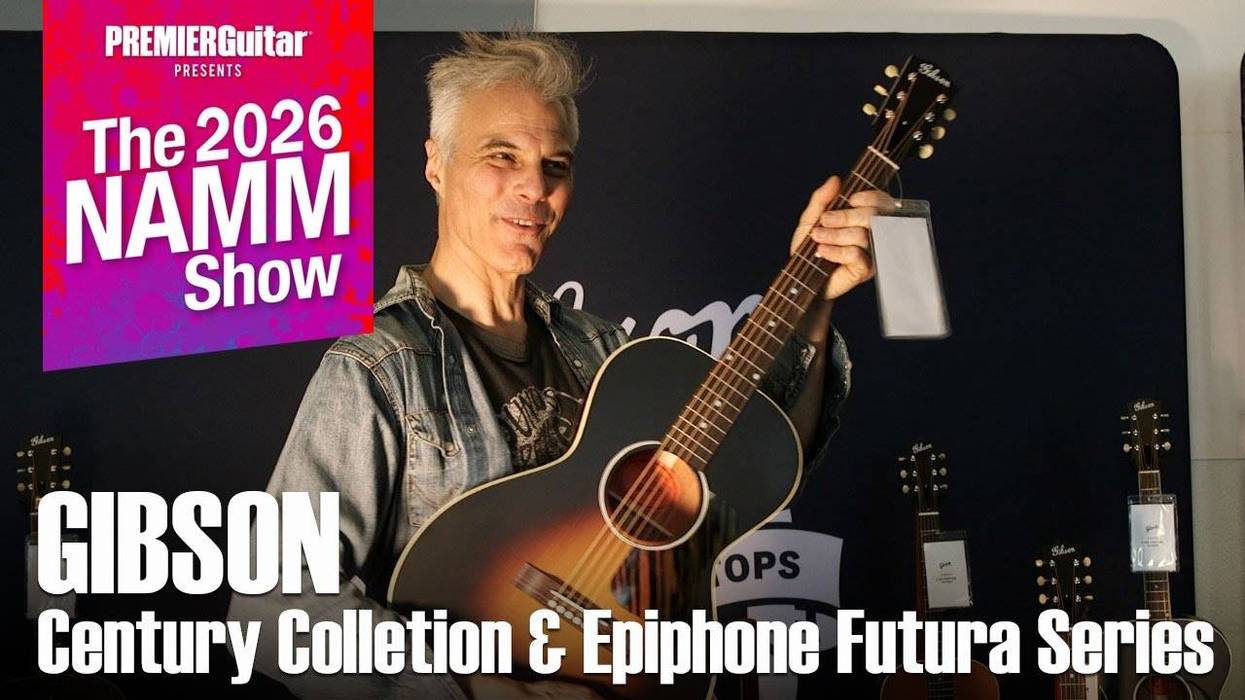
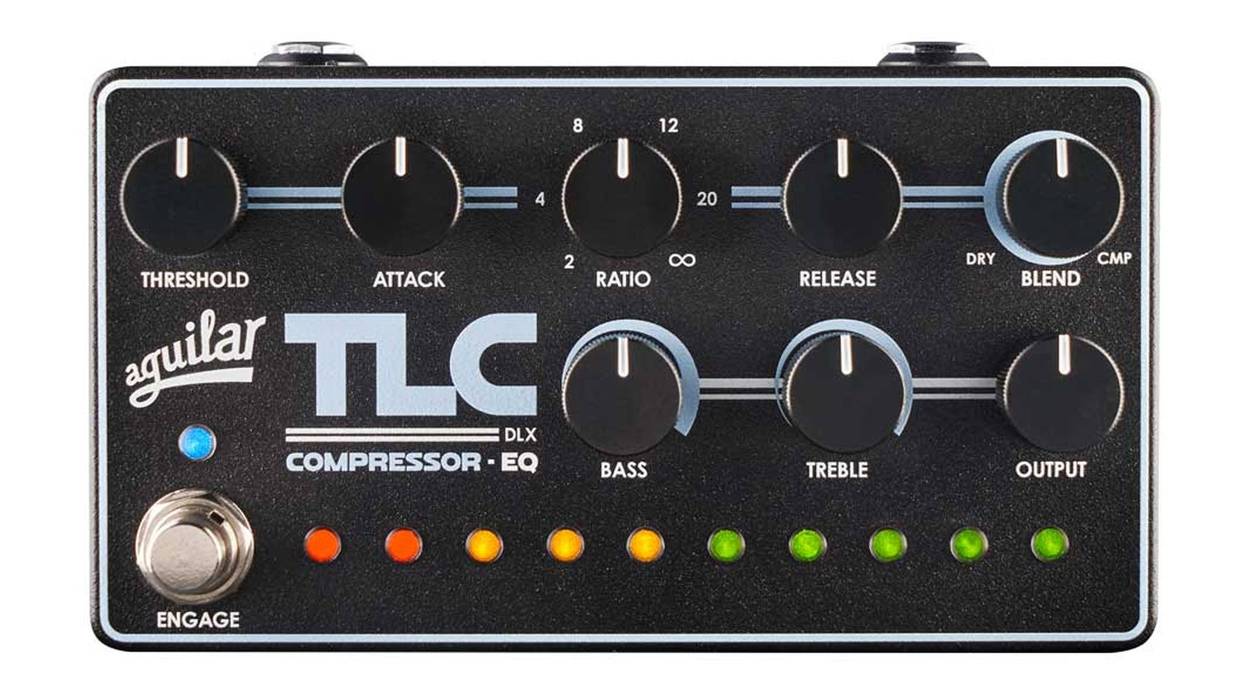

![Rig Rundown: Russian Circles’ Mike Sullivan [2025]](https://www.premierguitar.com/media-library/youtube.jpg?id=62303631&width=1245&height=700&quality=70&coordinates=0%2C0%2C0%2C0)
















![Rig Rundown: AFI [2025]](https://www.premierguitar.com/media-library/youtube.jpg?id=62064741&width=1245&height=700&quality=70&coordinates=0%2C0%2C0%2C0)











